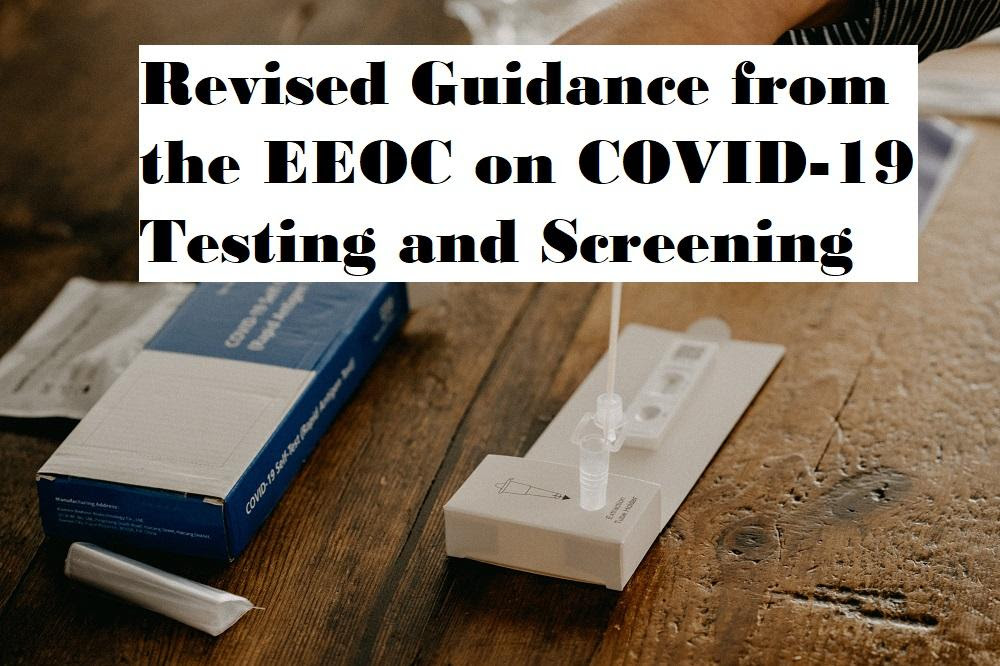Last month, the Equal Employment Opportunity Commission (EEOC) revised its Technical Assistance Guidance for COVID-19 testing and vaccines in the workplace.
Initially, the EEOC had stated that testing for SARS-CoV-2, the virus that causes COVID-19, was permissible for all on-site employees because of the pandemic.
While the pandemic is still ongoing, EEOC guidance now provides that COVID-19 diagnostic tests (as distinguished from antibody tests) are subject to the same restrictions as other medical tests, that is, screening must be job-related and consistent with business necessity.
The EEOC notes that the Americans with Disabilities Act (ADA) does allow an employer to require a note from “a qualified medical professional” that an employee is able to safely return to work after being out with COVID-19.
If the employer prefers, it can choose to follow CDC guidance to determine whether it’s safe to allow the employee to return to work.
However, the new guidance states that routine mandatory viral testing is permitted only when the employer can show that such screening is “job-related and consistent with business necessity.” Possible considerations in making the “business necessity” assessment include:
* the level of community transmission;
* the vaccination status of employees;
* the accuracy and speed of processing for different types of COVID-19 viral tests;
* the degree to which breakthrough infections are possible for employees who are “up to date” on vaccinations;
* the ease of transmissibility of the current COVID variant(s);
* the possible severity of illness from the current variant(s);
* the types of contacts employees may have with others where they work (for example, do they work with vulnerable populations?); and
* the potential impact on operations if an employee enters the workplace with COVID-19.
If that all sounds too complex, just remember that a mandatory test for the virus that causes COVID-19 should meet the “business necessity” standard when that testing is consistent with current guidance from the CDC, the FDA, and/or local public health authorities.
Mandatory antibody testing is still not allowed, according to the EEOC, because this type of test is not reliable to show whether an employee has a current infection or whether the employee is immune to infection.
Asking screening questions of employees entering the workplace is still permitted.
Further, the new guidance states that an employer can screen applicants for COVID-19 symptoms after a conditional job offer if it does so for all employees with the same type of job who enter the workplace.
Additionally, if an employer screens everyone (including visitors) who enter the workplace, applicants can be subjected to screening before entering the workplace for interviews.
However, employers can’t withdraw a job offer due to a positive test unless (1) the job requires an immediate start date, (2) CDC guidance recommends the person not be in proximity to others, and (3) the job requires such proximity to others.
Concern for someone who might be vulnerable (e.g., a person who is elderly, pregnant, or has an underlying medical condition) doesn’t allow an employer to postpone a start date or withdraw a job offer.
Notwithstanding this restriction, when an underlying medical condition qualifies as a disability under the ADA, the employer must determine whether the individual’s disability poses a “direct threat” to the employee or others if the employee starts work immediately.
If so, the employer must determine whether reasonable accommodation can be provided to sufficiently lessen or eliminate any risks without creating an undue hardship, as defined by the ADA.
The updated guidance also provides that when disabled employees need reasonable accommodation to comply with requirements to wear personal protective equipment (PPE), the employer should provide such reasonable accommodation if possible. The same is true for employees who need reasonable accommodation for religious reasons.
The EEOC updated a number of other sections of its COVID-19 related guidance as well. Please feel free to contact us if you have any questions about employment law as it relates to COVID-19 or any other employment-law issues.
For more information about employment law, see Employment Law (in Plain English)®, co-authored by members of this law firm. The book is available through Skyhorse Publishing, Amazon, Barnes & Noble, Powell’s Books, and Bookshop (an online bookstore that allows you to support your favorite independently owned bookstore).
Photo by Annie Spratt on Unsplash






